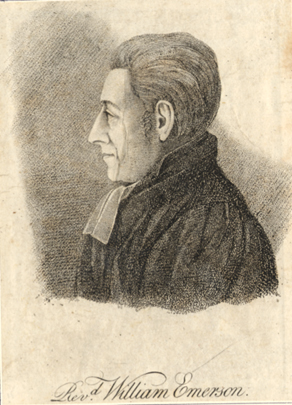 |
WILLIAM EMERSON
(1769-1811)
4. Engraved portrait of William Emerson, from the
Polyanthos,
May, 1812. Engraving bound into William Taylor Newton’s extra-illustrated
copy of Cabot’s A Life of Ralph Waldo Emerson. Extra-illustrated
Cabot from the Emerson collection of William Taylor Newton, presented by
Edith Emerson Forbes and Edward Waldo Emerson, 1918.
William Emerson—son of Concord’s Revolutionary minister and father of its Transcendental philosopher—was born in Concord in 1769, in the Block House (which then stood on the present site of the Middlesex Savings Bank, and now stands at 57 Lowell Road), before his parents moved to the Manse. He graduated from Harvard College in 1789, was settled as minister over the church in Harvard, Massachusetts, in 1792, and in 1799 became pastor of the First Church in Boston. In 1796, Emerson married Ruth Haskins (1768-1853), daughter of successful Boston merchant John Haskins, a cooper and distiller. Their eight children were: Phebe Ripley (1798-1800); John Clarke (1799-1807); William (1801-1868); Ralph Waldo (1803-1882); Edward Bliss (1805-1834); Robert Bulkeley (1807-1859); Charles Chauncy (1808-1836); and Mary Caroline (1811-1814). William and Ruth Emerson paid careful attention to both the religious and the intellectual development of their children. William, a liberal minister with a taste for literature, encouraged scholarship as well as religious devotion in his sons. He was a sociable man, well-respected in his community. His public position brought frequent visitors to the Emerson home. Ruth Haskins Emerson was a pious woman who met the various demands made upon her as the wife of a prominent man and as a mother. Ralph Waldo Emerson’s world was radically altered in 1811, when his father died, leaving Mrs. Emerson to support and raise the young family on her own. In a letter written to his brother William on February 10, 1850, Emerson recorded what little he could remember of their father, and his assessment of the man’s talents: “I was eight years old when he died, & only remember a somewhat social gentleman, but severe to us children, who twice or thrice put me in mortal terror by forcing me into the salt water off some wharf or bathing house … I have never heard any sentence or sentiment of his repeated by Mother or Aunt, and his printed or written papers, as far as I know, only show candour & taste, or I should almost say, docility, the principal merit possible to that early ignorant & transitional Month-of-March, in our New England culture. His literary merits really are that he fostered the Anthology & the Athenaeum. These things ripened into Buckminster Channing & Everett.”
No image in this online display may be reproduced in any form, including electronic, without permission from the Curator of Special Collections of the Concord Free Public Library.
Next Entry - Previous Entry - Back to Section I Contents Listing - Back to Exhibition Introduction - Back to Exhibition Table of Contents |